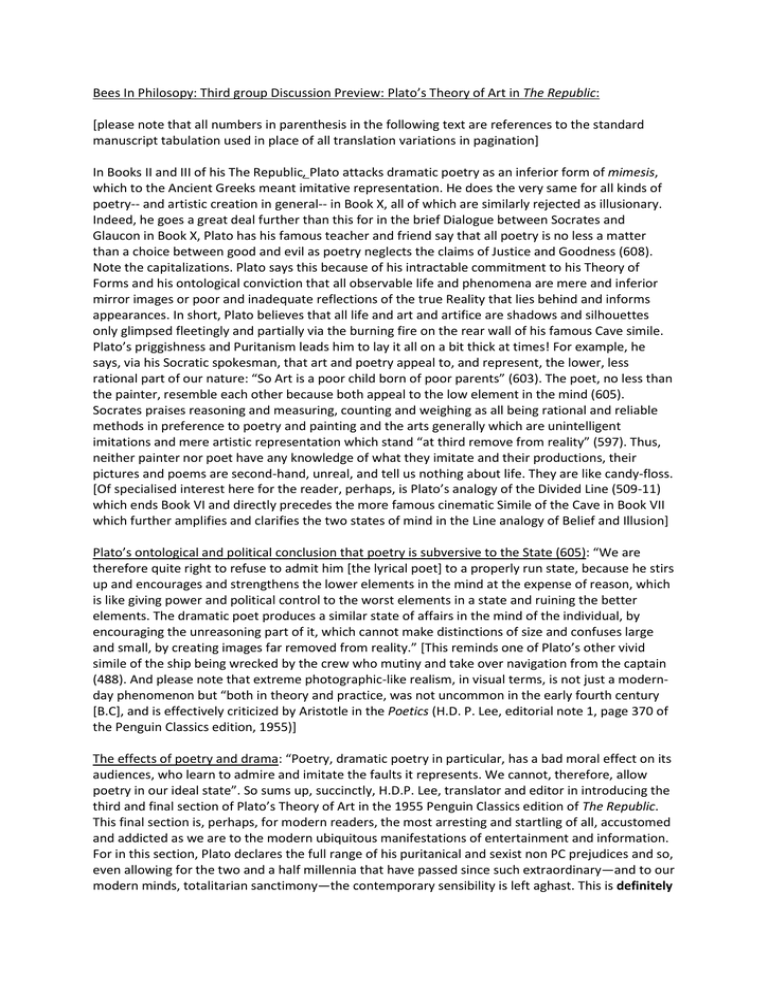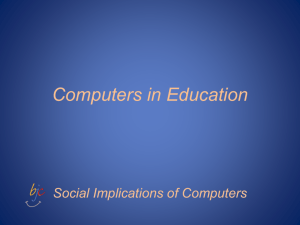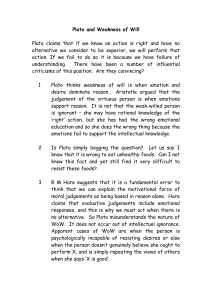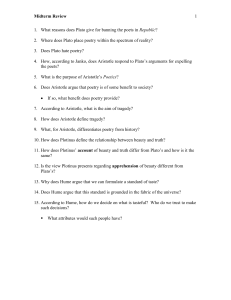Plato's Art Theory in The Republic
advertisement

Bees In Philosopy: Third group Discussion Preview: Plato’s Theory of Art in The Republic: [please note that all numbers in parenthesis in the following text are references to the standard manuscript tabulation used in place of all translation variations in pagination] In Books II and III of his The Republic, Plato attacks dramatic poetry as an inferior form of mimesis, which to the Ancient Greeks meant imitative representation. He does the very same for all kinds of poetry-- and artistic creation in general-- in Book X, all of which are similarly rejected as illusionary. Indeed, he goes a great deal further than this for in the brief Dialogue between Socrates and Glaucon in Book X, Plato has his famous teacher and friend say that all poetry is no less a matter than a choice between good and evil as poetry neglects the claims of Justice and Goodness (608). Note the capitalizations. Plato says this because of his intractable commitment to his Theory of Forms and his ontological conviction that all observable life and phenomena are mere and inferior mirror images or poor and inadequate reflections of the true Reality that lies behind and informs appearances. In short, Plato believes that all life and art and artifice are shadows and silhouettes only glimpsed fleetingly and partially via the burning fire on the rear wall of his famous Cave simile. Plato’s priggishness and Puritanism leads him to lay it all on a bit thick at times! For example, he says, via his Socratic spokesman, that art and poetry appeal to, and represent, the lower, less rational part of our nature: “So Art is a poor child born of poor parents” (603). The poet, no less than the painter, resemble each other because both appeal to the low element in the mind (605). Socrates praises reasoning and measuring, counting and weighing as all being rational and reliable methods in preference to poetry and painting and the arts generally which are unintelligent imitations and mere artistic representation which stand “at third remove from reality” (597). Thus, neither painter nor poet have any knowledge of what they imitate and their productions, their pictures and poems are second-hand, unreal, and tell us nothing about life. They are like candy-floss. [Of specialised interest here for the reader, perhaps, is Plato’s analogy of the Divided Line (509-11) which ends Book VI and directly precedes the more famous cinematic Simile of the Cave in Book VII which further amplifies and clarifies the two states of mind in the Line analogy of Belief and Illusion] Plato’s ontological and political conclusion that poetry is subversive to the State (605): “We are therefore quite right to refuse to admit him [the lyrical poet] to a properly run state, because he stirs up and encourages and strengthens the lower elements in the mind at the expense of reason, which is like giving power and political control to the worst elements in a state and ruining the better elements. The dramatic poet produces a similar state of affairs in the mind of the individual, by encouraging the unreasoning part of it, which cannot make distinctions of size and confuses large and small, by creating images far removed from reality.” [This reminds one of Plato’s other vivid simile of the ship being wrecked by the crew who mutiny and take over navigation from the captain (488). And please note that extreme photographic-like realism, in visual terms, is not just a modernday phenomenon but “both in theory and practice, was not uncommon in the early fourth century [B.C], and is effectively criticized by Aristotle in the Poetics (H.D. P. Lee, editorial note 1, page 370 of the Penguin Classics edition, 1955)] The effects of poetry and drama: “Poetry, dramatic poetry in particular, has a bad moral effect on its audiences, who learn to admire and imitate the faults it represents. We cannot, therefore, allow poetry in our ideal state”. So sums up, succinctly, H.D.P. Lee, translator and editor in introducing the third and final section of Plato’s Theory of Art in the 1955 Penguin Classics edition of The Republic. This final section is, perhaps, for modern readers, the most arresting and startling of all, accustomed and addicted as we are to the modern ubiquitous manifestations of entertainment and information. For in this section, Plato declares the full range of his puritanical and sexist non PC prejudices and so, even allowing for the two and a half millennia that have passed since such extraordinary—and to our modern minds, totalitarian sanctimony—the contemporary sensibility is left aghast. This is definitely not what most of us feel a democratic and civilised State is or should be about, and so it is difficult not to hear in our minds the merciless and all-too-familiar thunder of jackboots marching in irresistible uniformity outside our doors as we read the following. No précis could possibly do justice to its literary power so I will simply reproduce it here unedited and in full. However, when reading it, I would also ask you to pause and ponder that, as the editors (George Dickie and Richard J. Sclafini), cogently say in their text book, “Aesthetics: A Critical Anthology (St. Martin’s Press, Inc, 1977, p. 6): “It is not an understatement to say that Plato’s theory of art as imitation set the stage for practically all discussions of the nature of Western art for the next two thousand years.” For testimony to this, we need look no further than Professor Joad’s Chapter III, “Plato’s Philosophy” in his 1944 Philosophy book (see the reading list and last week’s handout) where he enthusiastically endorses Plato’s Theory of Art, even making the extraordinary observation that “granted the Fall, it is reasonable to suppose that, as the theologians would put it, we bear upon us the marks of original aesthetic as well as of original moral sin . . . [as we] are aesthetically blind and naturally prefer the ugly to the beautiful.” (p. 53) Aesthetics, ontology, metaphysics, and Christianity all in one! [NOTE: precisely at the point where Plato leaves off in this excerpt, is where we will begin our next group discussion session on September 21st with “Bees and . . . Plato and Poison and Poetry”!] Enjoy! “The gravest charge against poetry still remains. It has a terrible power to corrupt even the best of characters, with very few exceptions” “It is indeed terrible if it can do that.” “Then listen. When we hear Homer or one of the tragic poets representing the sufferings of a great man and making him bewail them at length with every expression of tragic grief, you know how even the best of us enjoy it and let ourselves be carried away by our feelings; and are full of praise for the merits of the poet who can powerfully affect us in this way.” “Yes, I know.” “ Yet in our private griefs we pride ourselves on just the opposite, that is, on our ability to bear them in silence like men, and we regard the behaviour we admired on the stage as womanish.” “Yes, I’m aware of that.” “Then is it really right”, I asked, “to admire, when we see him on the stage, a man we should ourselves be ashamed to resemble? Is it reasonable to feel enjoyment and admiration rather than disgust?” “It seems most unreasonable”, he said. “Particularly,” I added, “if you look at it in this way.” “How?” “If you consider that the poet gratifies and indulges the natural instinct for tears and the dsire to give full vent to our sorrows, both of which we restrain in our private misfortunes. Our better nature, being without adequate moral or intellectual training, relaxes its control, on the grounds that it is someone else’s sufferings it is watching and that there’s nothing wrong in praising and pitying another man with some claim to goodness, even though his grief is excessive; besides, it reckons the pleasure it gets as sheer gain, and would certainly not consent to be deprived of it by condemning the whole poem. For very few people are capable of realizing that our feelings for other people must influence ourselves, and that if we let ourselves feel excessively for the misfortunes of others it will be difficult to restrain our feelings in our own.” “That is very true.” “The same argument applies to laughter. For the effect is similar when you enjoy on the stage—or even in ordinary life—jokes that you would be ashamed to make yourself, instead of detesting their vulgarity. You are giving rein to your comic instinct, which your reason has restrained for fear you may seem to be playing the fool, and bad taste in the theatre may insensibly lead you into becoming a buffoon at home.” “It may indeed.” “Poetry has the same effect on us when it represents sex and anger, and the other desires and feelings of pleasure and pain which normally accompany our actions. It feeds them when they ought to be starved, and makes them control us when we ought, in the interests of our own welfare and happiness, to control them.” “I can’t deny it,” he said. [The BIG conclusion. Siegheil!] : “And so, Glaucon”, I continued, “when you meet people who admire Homer as the educator of Greece, and who say that in social and educational matters we should study him and model our lives on his advice, you must feel kindly towards them as good men within their limits, and you may agree with them that Homer is the best of poets and first of tragedians. But you will know that the only poetry that should be allowed in the state is hymns to the gods and paeans in praise of good men; once you go beyond that and admit the sweet lyric or epic muse, pleasure and pain become your rulers instead of law and the principles commonly accepted as best.” [my bold emphasis]. See you all next time!





